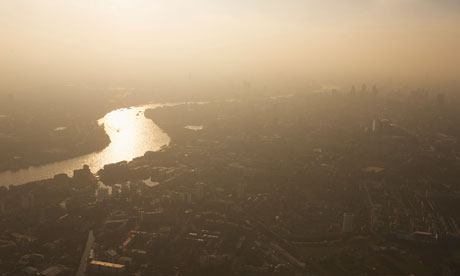Air pollution: European commission launches legal action against the UK
The UK faces fines of up to £300m a year and embarrassing court appearances after the European commission launched legal proceedings against it for failing to reduce “excessive” levels of nitrogen dioxide (NO2) air pollution from traffic, despite 15 years of warnings and several extensions and postponements granted to the government. Other European countries have also failed to meet the air quality directive – that should have been adopted in 2008 – but the EU environment commissioner, Janez Potočnik, has singled Britain out for its “persistent” breaches of the air quality directive. The government has been sent a letter of formal notice of the intention to take Britain to court. The UK has been given two months to respond. In a statement, the commission said that: “Nitrogen dioxide is the main precursor for ground-level ozone causing major respiratory problems and leading to premature death. City-dwellers are particularly exposed, as most nitrogen dioxide originates in traffic fumes … air pollution limits are regularly exceeded in 16 zones across the UK.”
The affected areas are Greater London, the West Midlands, Greater Manchester, West Yorkshire, Teesside, the Potteries, Hull, Southampton, Glasgow, the east, the south-east, the east Midlands, Merseyside, Yorkshire & Humberside, the west Midlands, and the north-east. But the commission said that Britain had not presented any “credible and workable plan” for meeting air quality standards by 2015.
Potočnik was spurred into action by the UK supreme court’s landmark ruling last year which declared that Britain was in breach of the directive and said: “The way [is] open to immediate enforcement action at national or European level.”
Air pollution causes 29,000 early deaths a year in the UK and the World Health Organisation has confirmed that air pollution causes cancer. Poor air quality also causes heart attacks and children living near busy roads in the UK have been shown to grow up with underdeveloped lungs.
According to Potočnik, poor air quality is the number one environmental cause of premature death in the EU with a toll that outstrips road traffic accidents. “It is an invisible killer and it prevents many people from living a fully active life. It already costs Europe €330bn-€940bn (£277bn-£789bn) a year in extra health costs and prematurely killed over 100,000 people a year,” he said last year.
While most British cities have plans to reduce traffic fumes to within the legal limit by 2020, London has insisted that it could not meet its NO2 targets set in 1999 until 2025 at the earliest. London has the highest levels of NO2 of any European capital city and the UK has the highest proportion of zones breaching legal limits.
James Thornton, director of Client Earth, a legal NGO that took the government to the supreme court last year, said: “We have the right to breathe clean air and the government has a legal duty to protect us from air pollution. The commission has singled out the UK following the supreme court’s landmark decision last year. The UK has some of the highest levels of nitrogen dioxide in Europe.”
“This much-needed legal action will hopefully end a national scandal that causes tens of thousands of people to die prematurely each year because of poor air quality. The UK government and mayor of London must now take tough and urgent measures to protect us all – particularly the most vulnerable and disadvantaged, who are hardest hit,” said a Friends of the Earth spokeswoman.
“If Owen Paterson wants to avoid another disaster for his department he will need an ambitious plan to protect people from deadly diesel fumes. We need a national network of low emission zones to save lives and make the UK a world leader in clean transport.”
“This is the EU at its best taking legal action against the UK at its worst,” said Simon Birkett, director of Clean Air in London.
A spokesperson from the UK government’s Department for Environment, Food and Rural Affairs, said: “Air quality has improved significantly in recent decades. Just like for other member states, meeting the NO2 limit values alongside busy roads has been a challenge.
“That is why we are investing heavily in transport measures to improve air quality around busy roads and we are working with the commission to ensure this happens as soon as possible.”
Fonte: theguardian.com




